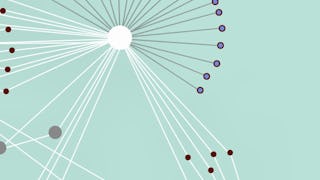Internet of things (IoT) has become a significant component of urban life, giving rise to “smart cities.” These smart cities aim to transform present-day urban conglomerates into citizen-friendly and environmentally sustainable living spaces. The digital infrastructure of smart cities generates a huge amount of data that could help us better understand operations and other significant aspects of city life.


Expérience recommandée
Expérience recommandée
Ce que vous apprendrez
Describe types of smart city-generated datasets, data mining techniques, and how to implement them using Python 3.
Explain how to read and preprocess data for data mining.
Apply data mining techniques to smart city-generated data and visualize and interpret the physical implications of the results.
Détails à connaître

Ajouter à votre profil LinkedIn
12 devoirs
Découvrez comment les employés des entreprises prestigieuses maîtrisent des compétences recherchées


Obtenez un certificat professionnel
Ajoutez cette qualification à votre profil LinkedIn ou à votre CV
Partagez-le sur les réseaux sociaux et dans votre évaluation de performance

Il y a 8 modules dans ce cours
This module provides an overview of the course content and structure. In this module, you will learn about the different course elements. In this module, you will get acquainted with your instructor and get an opportunity to introduce yourself and interact with your peers.
Inclus
2 vidéos1 lecture1 sujet de discussion
In this module, you will learn about data mining, why we need it, and the approach. The module also presents the basics of probability and statistics, which form the foundation for data mining. You will also gain insight into data preprocessing and data mining task identification.
Inclus
12 vidéos4 lectures2 devoirs1 sujet de discussion
In this module, you will learn about Python programming for data mining. The module also discusses important Python modules: NumPy , SciPy, and Matplotlib. You will learn to install Python using Anaconda and use the Jupyter notebook to write your code. The module also presents some examples demonstrating data preprocessing using Python.
Inclus
6 vidéos4 lectures2 devoirs3 laboratoires non notés
In this module, you will learn about supervised learning (learning from examples). The module discusses two supervised learning tasks: regression and classification. You will also gain insights into several classification algorithms such as Bayesian classifiers, decision trees, support vector machines (SVM), and ensemble classifiers.
Inclus
12 vidéos5 lectures2 devoirs1 sujet de discussion9 laboratoires non notés
In this module, you will learn about unsupervised learning (learning from unlabelled data without any ground truth labels). The module also discusses frequent itemset mining. You will also gain an insight into several data clustering algorithms such as distribution-based, partitional, and hierarchical clustering.
Inclus
11 vidéos5 lectures2 devoirs1 sujet de discussion7 laboratoires non notés
In this module, you will learn about anomaly detection problems and algorithms. You will gain insight into anomaly detection techniques. You will learn to validate your results. When applying data mining to smart city data, you will also learn to avoid false discoveries using statistical significance testing and hypothesis testing.
Inclus
5 vidéos2 lectures2 devoirs4 laboratoires non notés
In this module, you will learn about some advanced data mining algorithms such as artificial neural networks (ANN) and deep learning. You will develop an understanding of the applications of these algorithms. The module also analyzes hidden Markov models (HMMs) for modeling time series (sequential) data.
Inclus
10 vidéos3 lectures1 devoir1 sujet de discussion4 laboratoires non notés
In this module, you are provided with your term-end project, instructions to complete the project, and the criteria for how your instructor will grade your submission.
Inclus
1 vidéo2 lectures1 devoir1 laboratoire non noté1 plugin
Instructeur

Offert par
Recommandé si vous êtes intéressé(e) par Data Analysis


University of Illinois Urbana-Champaign


École Polytechnique Fédérale de Lausanne


University of Colorado Boulder
Pour quelles raisons les étudiants sur Coursera nous choisissent-ils pour leur carrière ?





Ouvrez de nouvelles portes avec Coursera Plus
Accès illimité à 10,000+ cours de niveau international, projets pratiques et programmes de certification prêts à l'emploi - tous inclus dans votre abonnement.
Faites progresser votre carrière avec un diplôme en ligne
Obtenez un diplôme auprès d’universités de renommée mondiale - 100 % en ligne
Rejoignez plus de 3 400 entreprises mondiales qui ont choisi Coursera pour les affaires
Améliorez les compétences de vos employés pour exceller dans l’économie numérique
Foire Aux Questions
Access to lectures and assignments depends on your type of enrollment. If you take a course in audit mode, you will be able to see most course materials for free. To access graded assignments and to earn a Certificate, you will need to purchase the Certificate experience, during or after your audit. If you don't see the audit option:
The course may not offer an audit option. You can try a Free Trial instead, or apply for Financial Aid.
The course may offer 'Full Course, No Certificate' instead. This option lets you see all course materials, submit required assessments, and get a final grade. This also means that you will not be able to purchase a Certificate experience.
When you purchase a Certificate you get access to all course materials, including graded assignments. Upon completing the course, your electronic Certificate will be added to your Accomplishments page - from there, you can print your Certificate or add it to your LinkedIn profile. If you only want to read and view the course content, you can audit the course for free.
You will be eligible for a full refund until two weeks after your payment date, or (for courses that have just launched) until two weeks after the first session of the course begins, whichever is later. You cannot receive a refund once you’ve earned a Course Certificate, even if you complete the course within the two-week refund period. See our full refund policy.


